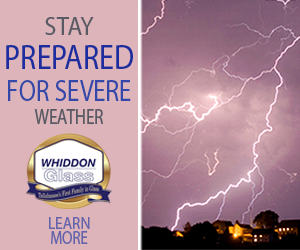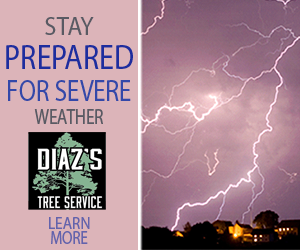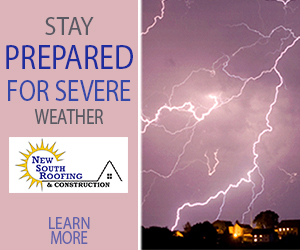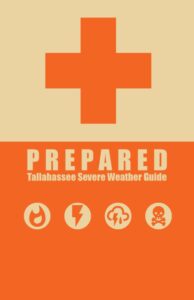Lightning strikes, intense heat, freezing temperatures, massive rainfall and thunderstorms, high humidity, and high winds are all part of Tallahassee’s weather throughout the year.

Staying prepared for severe weather may involve specific preparations for your particular circumstances. At the same time, we have in common those plans and procedures that none of us should ignore.
Tallahassee Prepared Presenting Sponsor
Since 1945, Whiddon Glass has been making homes and businesses more beautiful, more stylish, and more secure. This is a family-owned company devoted to making sure you are prepared for severe weather 365 with a wide selection of high-end products and three generations of experience. Window glass replacement, shower enclosures, mirrors, store fronts, and table tops are all there for you.
When you call Whiddon Glass, you are dealing with experienced, reliable professionals who offer only the best products and services.
Download your FREE severe weather guide!
Your severe weather guide is designed to equip you with the basic information you need and help you find the professional assistance that should be sought in each of the areas represented. In each case, we have presented the most reliable and accurate information available on the topic. Download and keep it handy for quick reference.







As you review the areas of important information provided here, you will find that there are some general guidelines that each of us should observe:
- Have a plan
- Respond quickly
- Follow professional advice
Tallahassee Prepared is an authorized NOAA/National Weather Service Weather-Ready Nation Ambassador™ for Tallahassee and the Big Bend Florida region.
Be Weather-Ready
Check the forecast regularly to see if you’re at risk for severe weather. Listen to local news or NOAA Weather Radio to stay informed about severe thunderstorm watches and warnings. Check the Weather-Ready Nation for tips.
Sign Up for Notifications
Know how your community sends warnings. Some communities have outdoor sirens. Others depend on media and smartphones to alert residents to severe storms.
Create a Communications Plan
Have a family plan that includes an emergency meeting place and the necessary contact information. Pick a safe room in your home, such as a basement, storm cellar, or an interior room on the lowest floor with no windows. Get more ideas for a plan at: https://www.ready.gov/make-a-plan
Practice Your Plan
Conduct a family severe thunderstorm drill regularly so everyone knows what to do if damaging winds or large hail are approaching. Make sure all members of your family know to go there when severe thunderstorm warnings are issued. Don’t forget pets if time allows.
Prepare Your Home
Keep trees and branches trimmed near your house. If you have time before severe weather hits, secure loose objects, close windows and doors, and move any valuable objects inside or under a sturdy structure.
Help Your Neighbor
Encourage your loved ones to prepare for severe thunderstorms. Take CPR training so you can help if someone is hurt during severe weather.



